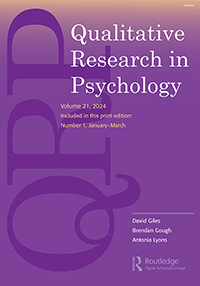模仿作为一种分析方法:理解参与者的观点
IF 4.4
3区 心理学
Q1 PSYCHOLOGY, MULTIDISCIPLINARY
引用次数: 0
摘要
摘要本文讨论了如何以及为什么模仿研究参与者的语言和非语言可以提高我们对咨询互动过程的理解。介绍了一个研究项目的经验,以说明分析过程中的挑战和优势。项目期间开发了一种分析方法,其中使用了对参与者语言和非语言的模仿。模仿作为一种分析方法,以“身体现象学”作为参考框架进行了讨论。结论是,模仿可以作为一种工具来理解参与者的观点,从而全面了解他们之间的互动,从而增加对咨询过程的理解。这是可能的,因为模仿激活了研究者基于身体经验和隐性知识的洞察力。因此,可以加强对这一研究现象的解释和理论化。本文章由计算机程序翻译,如有差异,请以英文原文为准。
Imitation as a method of analyses: Understanding participants’ perspectives
ABSTRACT This article discusses how and why imitation of research participants’ verbal and non-verbal language can improve our understanding of interaction processes in counselling. Experiences from a research project are presented to illustrate challenges and advantages in the process of analysis. An analytical approach was developed during the project, in which imitation of the participants’ verbal and non-verbal language was used. Imitation as a method of analysis is discussed with ‘phenomenology of the body’ as a frame of reference. The conclusion is that imitation can add to the understanding of counselling processes by serving as a tool for understanding participants’ perspectives in a way that gives a holistic picture of the interaction between them. This is possible because imitation activates the researcher’s insight based on bodily experience and tacit knowledge. Thus, interpretation and theorizing of the research phenomenon can be strengthened.
求助全文
通过发布文献求助,成功后即可免费获取论文全文。
去求助
来源期刊

Qualitative Research in Psychology
PSYCHOLOGY, MULTIDISCIPLINARY-
CiteScore
20.00
自引率
0.50%
发文量
14
期刊介绍:
Qualitative Research in Psychology is an international, peer-reviewed journal that publishes high-quality, original research. It aims to become the primary forum for qualitative researchers in all areas of psychology, including cognitive, social, developmental, educational, clinical, health, and forensic psychology. The journal also welcomes psychologically relevant qualitative research from other disciplines. It seeks innovative and pioneering work that advances the field of qualitative research in psychology.
The journal has published state-of-the-art debates on various research approaches, methods, and analytic techniques, such as discourse analysis, interpretative phenomenological analysis, visual analyses, and online research. It has also explored the role of qualitative research in fields like psychosocial studies and feminist psychology. Additionally, the journal has provided informative articles on ethics, transcription, interviewee recruitment, and has introduced innovative research techniques like photovoice, autoethnography, template analysis, and psychogeography.
While the predominant audience consists of psychology professionals using qualitative research methods in academic, clinical, or occupational settings, the journal has an interdisciplinary focus. It aims to raise awareness of psychology as a social science that encompasses various qualitative approaches.
In summary, Qualitative Research in Psychology is a leading forum for qualitative researchers in psychology. It publishes cutting-edge research, explores different research approaches and techniques, and encourages interdisciplinary collaboration.
 求助内容:
求助内容: 应助结果提醒方式:
应助结果提醒方式:


